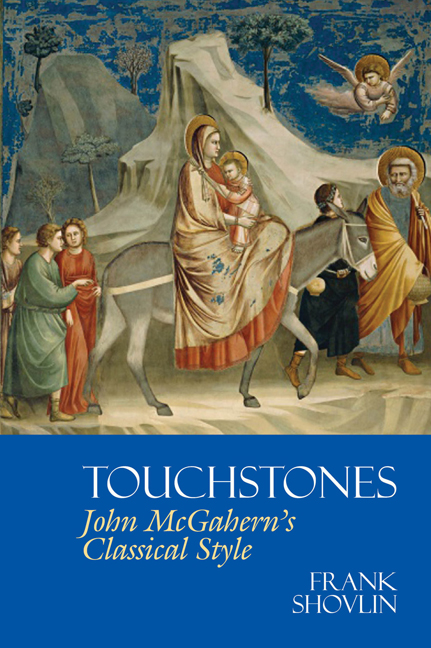Book contents
- Frontmatter
- Dedication
- Epigraph
- Contents
- Acknowledgements
- Touching Stones: Matthew Arnold and the Canon
- 1 We Other Clerks: James Joyce and the Classical Temper
- 2 A Walking Mirror: Stendhal, Horace, Nietzsche
- 3 One Lone Paperback: Tolstoy and Religious Sensibility
- 4 Magic: The Centrality of W. B. Yeats
- 5 Instinct: Douglas Stewart and Sex
- 6 The Fume of Muscatel: Yeats's Ghosts
- 7 Bohemian Rhapsody: Patrick Kavanagh and Generation X
- 8 Absurdity: Camus Comes to Clones
- 9 Aristocracy: Andrew Marvell, W. B. Yeats and the Curse of Cromwell
- 10 The Consolations of Nothingness: William Blake, W. B. Yeats and Prayer
- 11 Deliberate Happiness: W. B. Yeats and the Inner Life
- 12 Stranger in Paradise: Dante and Epic Style
- Conclusion: What Then?
- Bibliography
- Index
3 - One Lone Paperback: Tolstoy and Religious Sensibility
from Touching Stones: Matthew Arnold and the Canon
- Frontmatter
- Dedication
- Epigraph
- Contents
- Acknowledgements
- Touching Stones: Matthew Arnold and the Canon
- 1 We Other Clerks: James Joyce and the Classical Temper
- 2 A Walking Mirror: Stendhal, Horace, Nietzsche
- 3 One Lone Paperback: Tolstoy and Religious Sensibility
- 4 Magic: The Centrality of W. B. Yeats
- 5 Instinct: Douglas Stewart and Sex
- 6 The Fume of Muscatel: Yeats's Ghosts
- 7 Bohemian Rhapsody: Patrick Kavanagh and Generation X
- 8 Absurdity: Camus Comes to Clones
- 9 Aristocracy: Andrew Marvell, W. B. Yeats and the Curse of Cromwell
- 10 The Consolations of Nothingness: William Blake, W. B. Yeats and Prayer
- 11 Deliberate Happiness: W. B. Yeats and the Inner Life
- 12 Stranger in Paradise: Dante and Epic Style
- Conclusion: What Then?
- Bibliography
- Index
Summary
From them she went as a housemaid in the family of the district police-officer, but only stayed three months because the policeofficer, a man of fifty, began to pester her with his attentions, and once when he was being particularly insistent she lost her temper, called him a fool and an old devil, and gave him such a push in the chest that he fell. She was dismissed for her rudeness.
Leo Tolstoy, Resurrection‘He looks like something out of a Russian novel’ – so says Robert Booth about Bill Evans in That They May Face the Rising Sun. Booth is a well-spoken Ulsterman, a literary gent with a double first from Oxford, clearly modelled on McGahern's first editor at Faber, Charles Monteith, to whom he dedicates Nightlines. Bill Evans is a neighbour to the Ruttledges, a farm labourer and product of Ireland's shameful past of incarceration and mistreatment of its poor, vulnerable and abandoned. Far from being a fictional character, as Booth would have it, Ruttledge knows, in his riposte, that such men are all too common in the Irish countryside:
He's all ours, completely home-grown and mad alive. They were scattered all over the country when I was young. Those with English accents came mostly from Catholic orphanages in Liverpool. The whole business wasn't a million miles from the slave trade.
But while Ruttledge might want to pull Booth up for putting this real, downtrodden man into a literary frame, there is also a kind of self-referencing going on here, with McGahern conscious of the many parallels between the Ireland of his time and that narrated by the celebrated nineteenth-century Russian realists, Turgenev, Tolstoy and Chekhov.
Though McGahern admired all of these writers a great deal and is sometimes rather lazily described as ‘the Irish Chekhov’ (a journalistic term also frequently applied to Brian Friel), it is to Tolstoy I would wish to turn to consider his greatest debt to the Russians. Tolstoy is the only writer from whom McGahern has borrowed a text tout court and adapted it for his own purposes – in this case to create his one published play The Power of Darkness (1991).
- Type
- Chapter
- Information
- Touchstones: John McGahern’s Classical Style , pp. 47 - 57Publisher: Liverpool University PressPrint publication year: 2016



